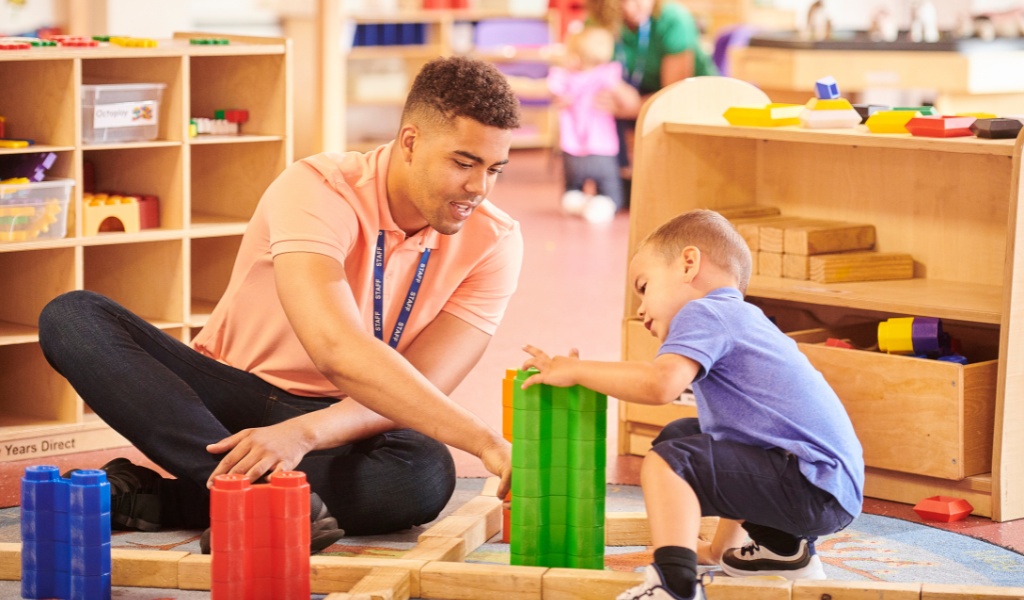In this blog, early years expert David Wright (AKA Mr Paint Pots) explores the importance of relationships in early childhood.
Recently, I read this extraordinary tweet from an educationalist – “New born babies are universally stupid.” Was this a deliberate provocation I wondered, or was it a genuinely held belief? This commentator has certainly placed himself firmly in the ‘young children as blank canvas’ camp.
For proponents of the notion that the purpose of education is solely to instil knowledge, academic achievement is assessed by the ability to retain and recall facts – “the best that has been thought and said” (Matthew Arnold). In effect, our children’s value is determined by their exam results and our systems are focused on the most effective methods for enabling as many children as possible to meet the expected standard in a narrow range of academic subjects.

It is true that new-born babies have not yet acquired banks of knowledge, so called cultural capital, but they are sentient and emotional beings with the potential to not only retain information but also to “develop creative and innovative minds capable of discovery” (Jean Piaget). However, renowned child psychologist Alison Gopnik contends that “young children are actually smarter, more imaginative, more caring and even more conscious than adults.”

It is horrifying to reflect that not so long ago medical procedures were conducted on infants without anaesthetic in the mistaken belief that they did not feel pain. We now know so much more about the development and working of the brain and its interactions with the body’s homeostatic systems. Dr Daniel Siegel describes the brain as “the embodied mechanism of energy and information flow.” In fact, by the time we first encounter the child in an early care and education (ECE) setting, he/she has already experienced a phenomenal growth in the brain’s neural pathways in response to information flow from our inner world of the body and input from our five senses – our relationship with the outer world, including other people.

We are born primed for connection with others. Relationships are key to our survival as mammals, whilst the nature of our interactions with other human beings determines the shaping of our brains. Our children need to know that we will keep them safe, warm, fed and well to stay alive. They also need our focus in response to their attempts to communicate with us. Children’s attunement and attachment needs are vital for their wellbeing and personal, social and emotional development.
The convictions we hold about children determine our attitudes regarding their capabilities, needs and their rights. This in turn provides guidance as to what we need to pay attention to in carrying out our professional ECE role. Do we consider ourselves primarily as babysitters, ensuring ‘universally stupid’ children come to no physical harm and that they are clean and fed ready for collection at the end of the day? Are we teachers tasked with preparing children to pass exams and enter the workforce as productive contributors to the economy? Or do we maintain a deeper understanding of what it means to be human – the possibility of all children developing to fulfil their unique potential?

It is my belief that positive relationships are the bedrock of ECE. Teaching and learning is mediated through relationship. It is our responsibility and privilege to know and support these children whilst they develop. This is what makes our work so fulfilling.
About the author:

David Wright is a former owner and now an ambassador for Paint Pots Nurseries in Southampton. He has 18 years experience as an Early Years Teacher. David was the 2022 recipient of a Lifetime Achievement award from Nursery World magazine in recognition of his services to the Early Years sector. He is the national representative for England to the World Forum on Early Childhood Education (ECE) and the global lead for their Men in ECE working group.
David is a consultant, author, broadcaster, commentator, presenter and international conference speaker on Early Years. He is an advisor to the Early Years sector council of the National Association of Head Teachers and a member of the leadership team of the South East Region of the Ofsted Big Conversation. He is the founder of Families First Southampton, a charity supporting families in need. He is the chair of trustees of New Life Home Trust UK CIO, a charity that supports the rescue of abandoned babies in Kenya. David is a passionate advocate and campaigner for the rights of all children and for Men in Early Years.